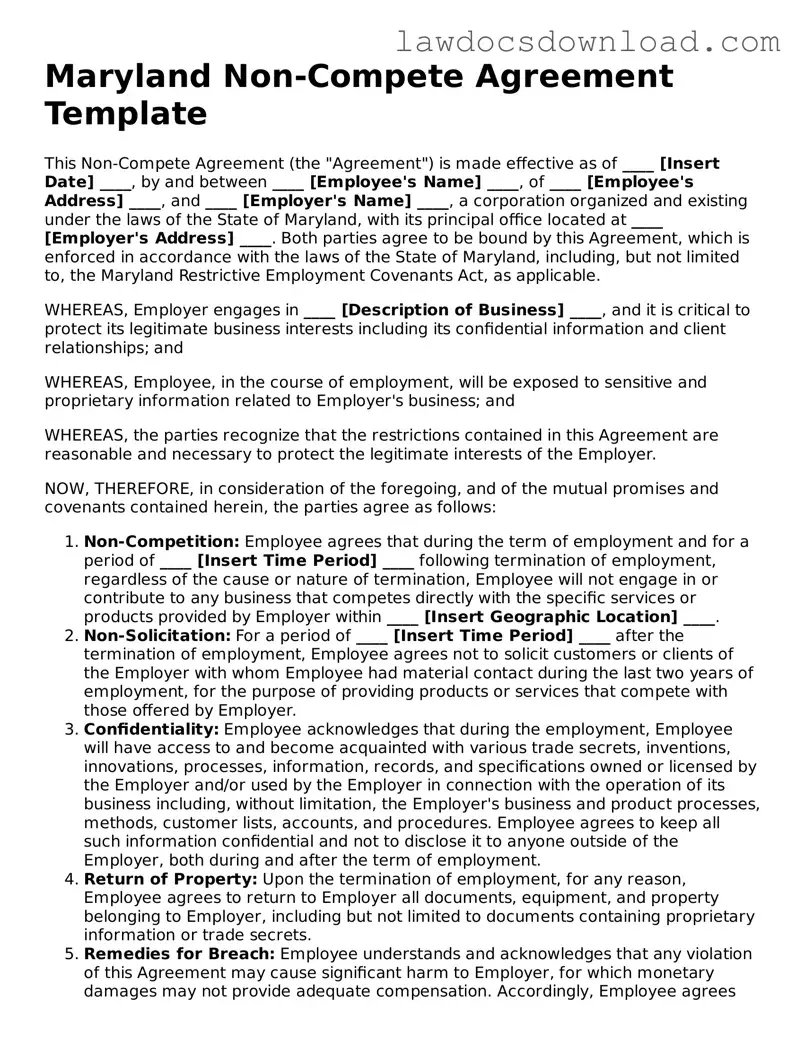Maryland Non-Compete Agreement Template
This Non-Compete Agreement (the "Agreement") is made effective as of ____ [Insert Date] ____, by and between ____ [Employee's Name] ____, of ____ [Employee's Address] ____, and ____ [Employer's Name] ____, a corporation organized and existing under the laws of the State of Maryland, with its principal office located at ____ [Employer's Address] ____. Both parties agree to be bound by this Agreement, which is enforced in accordance with the laws of the State of Maryland, including, but not limited to, the Maryland Restrictive Employment Covenants Act, as applicable.
WHEREAS, Employer engages in ____ [Description of Business] ____, and it is critical to protect its legitimate business interests including its confidential information and client relationships; and
WHEREAS, Employee, in the course of employment, will be exposed to sensitive and proprietary information related to Employer's business; and
WHEREAS, the parties recognize that the restrictions contained in this Agreement are reasonable and necessary to protect the legitimate interests of the Employer.
NOW, THEREFORE, in consideration of the foregoing, and of the mutual promises and covenants contained herein, the parties agree as follows:
- Non-Competition: Employee agrees that during the term of employment and for a period of ____ [Insert Time Period] ____ following termination of employment, regardless of the cause or nature of termination, Employee will not engage in or contribute to any business that competes directly with the specific services or products provided by Employer within ____ [Insert Geographic Location] ____.
- Non-Solicitation: For a period of ____ [Insert Time Period] ____ after the termination of employment, Employee agrees not to solicit customers or clients of the Employer with whom Employee had material contact during the last two years of employment, for the purpose of providing products or services that compete with those offered by Employer.
- Confidentiality: Employee acknowledges that during the employment, Employee will have access to and become acquainted with various trade secrets, inventions, innovations, processes, information, records, and specifications owned or licensed by the Employer and/or used by the Employer in connection with the operation of its business including, without limitation, the Employer's business and product processes, methods, customer lists, accounts, and procedures. Employee agrees to keep all such information confidential and not to disclose it to anyone outside of the Employer, both during and after the term of employment.
- Return of Property: Upon the termination of employment, for any reason, Employee agrees to return to Employer all documents, equipment, and property belonging to Employer, including but not limited to documents containing proprietary information or trade secrets.
- Remedies for Breach: Employee understands and acknowledges that any violation of this Agreement may cause significant harm to Employer, for which monetary damages may not provide adequate compensation. Accordingly, Employee agrees that in addition to any other remedy that may be available at law or in equity, Employer shall be entitled to specific performance and injunctive relief to prevent breaches of the provisions of this Agreement and to enforce specifically the terms and provisions hereof in any action instituted in any court of competent jurisdiction in the State of Maryland.
This Agreement represents the entire agreement between the Employee and Employer regarding the subject matter hereof, and supersedes all prior negotiations, representations, or agreements between Employee and Employer, either written or oral.
This Agreement may be amended or modified only by a written document signed by both parties.
IN WITNESS WHEREOF, the parties hereto have executed this Agreement as of the first date above written.
Employee Signature: ___________________________ Date: ___________
Employer Signature: ___________________________ Date: ___________

